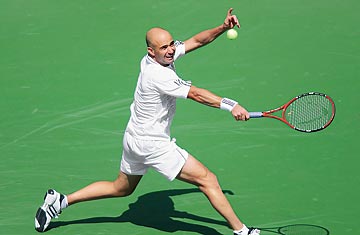
Despite his woes, Andre Agassi took eight Grand Slams.
Andre Agassi's memoir, open: An Autobiography (Alfred A. Knopf; 388 pages), is just as entrancing as his tennis game. Agassi's mind pops back and forth like a ball during one of his rallies: I hate the sport, winning is fun, my father preys on me, but I understand why. It's a perpetual struggle, yet Agassi, who won eight Grand Slams, survives the excruciating points, and your eyes stay glued to the action. He can hit a loud smash. In case you haven't heard, at one point in his career Agassi grew quite fond of crystal meth. Still, his soft shots carry the day. Agassi describes, in exquisite detail, how he wooed Steffi Graf by cobbling together a birthday card out of two airplane menus and raffia coiled around a champagne bottle. All together now: awwww.
Sports has a proud history of producing self-serving, cliché-ridden memoirs. But by sharing an unvarnished, at times inspiring story in an arresting, muscular style, Agassi may have just penned one of the best sports autobiographies of all time. Check--it's one of the better memoirs out there, period.
He had help. Agassi leaned on J.R. Moehringer, who won a Pulitzer for feature writing in 2000, to craft mounds of interview transcripts into a coherent narrative, told in the present tense. (Moehringer, feeling that the book belonged to Agassi alone, refused to put his name on the cover.) Their doubles team clicked. One passage describes how a teenage Andre, landing in Las Vegas after a tournament in Seoul, makes the bold decision to embrace his taskmaster dad. Mike Agassi tortured his son with endless drills; he wasn't the cuddly type. When the moment arrives, Mike "stiffens," Agassi writes. "It feels like hugging the pilot." To whoever penned that line: post-ace applause.
Fans will devour Agassi's juicy revelations about both himself and other tennis luminaries. Thanks to his father, Agassi's childhood was hellish, the backyard court his personal prison. Later, he battled depression, donned a hairpiece, dabbled in drugs and threw a hissy fit after his then girlfriend (now ex-wife) Brooke Shields licked Joey's hand on that episode of Friends. According to Agassi, Boris Becker blows, Pete Sampras is a terrible tipper, and in the Wimbledon locker room John McEnroe once called Agassi's future wife Graf a bitch.
Open is not without faults. Sometimes Agassi's photographic memory works against him. Even the most fervent racquetheads will tire of the play by play. But if you're remotely intrigued by the mysteries of sports psychology, don't skip Agassi's breakdown of his classic 2005 U.S. Open win against James Blake. Agassi uncoils the choices a player must make in nanoseconds--"How aggressive do I want to be? Where do I want to station myself?"--while bringing you into the belly of his brain. "Rip it," Agassi tells himself. "Rip it, rip it, you f___."
The book devotes a heap of space to profiling the posse that aided Agassi's rise. Gil Reyes is the hulking trainer--part bodyguard, part wizard--who forced Agassi to funnel a cocktail of salt, electrolytes and vitamins known as Gil water before matches. Brad Gilbert is the Bud-guzzling coach who made Agassi a master strategist. There's the childhood best friend/manager, the pastor and the brother who always stuck by him. They are compelling characters. Agassi, however, should have given them florid thank-you notes in person, not on the page.
